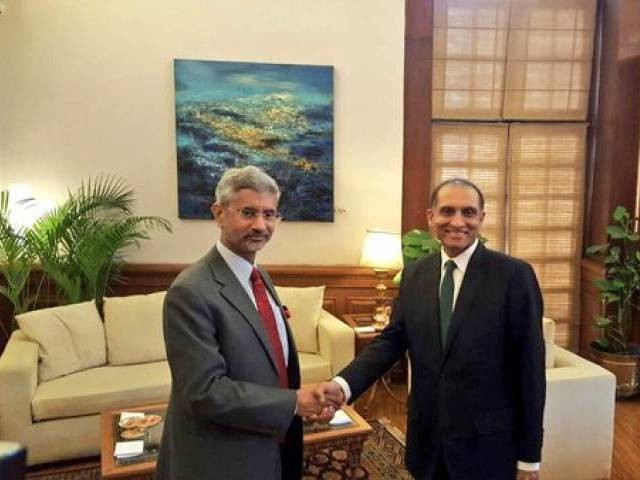Indian diplomats to pull out kids from schools in Pakistan
The two countries have been engaged in a war of words since the killing of Kashmiri separatist leader Burhan Wani

Foreign Secretary Aizaz Ahmed Chaudhry shakes hands with his Indian counterpart Subrahmanyam Jaishankar on Tuesday. PHOTO: MEA INDIA
Islamabad, however, dismissed the move as an “informal, internal, administrative” arrangement of the Indian government. “With effect from this academic session, officials posted in the High Commission of India in Islamabad have been advised to make arrangements for education of their wards outside Pakistan, till further notice,” a spokesperson for India’s external affairs ministry said in a statement.
Rejecting ‘Indian aggression’: JI plans Wagah border march next week
“It is a normal practice for all countries to review staffing and related policies for their diplomatic missions, including in view of prevailing circumstances at those stations,” the ministry spokesperson, Vikas Swarup, added.
There are about 50 children of Indian diplomats and other officials currently studying in Islamabad’s American School. In Islamabad, Foreign Office spokesperson Nafees Zakaria confirmed the decision had been ‘informally’ conveyed to Pakistan around one and a half month back.
“They conveyed informally that their government has taken this decision as an internal, administrative and informal arrangement,” Zakaria told The Express Tribune. He refused further comments on the matter.
It is unclear why New Delhi has taken this decision, though an Indian official told The Indian Express newspaper that it “amounts to a downgrade of Pakistan as a non-school-going station”.
And Indian officials did not rule out a ‘tit-for-tat’ response by Islamabad in the form of recall of children of Pakistani diplomats from India, according to the Times of India newspaper.
Some media reports indicated the move was linked to the simmering tensions between the two nuclear armed neighbours in the wake of current unrest in the disputed Kashmir region.
Pakistan to appeal UN for Kashmir observers
The two countries have been engaged in an escalating verbal duel since violence broke out in Kashmir following the killing of a popular separatist leader Burhan Wani. Indian security forces used brute force to quell widespread protests triggered by Wani’s killing by police on July 8.
And since then, 50-plus Kashmir civilians have been killed and thousands others injured. Unabated Indian atrocities angered Pakistan as the government officially announced a ‘black day’ on July 20. Rallies were staged across the country to express solidarity with the Kashmiri people.
A day earlier, Kashmir’s Accession to Pakistan Day was also observed in the country. In view of growing public anger, the Indian government had appealed to Pakistan to strengthen security for Indian officials stationed there.
“In view of the threats of marches and protests at the High Commission of India in Islamabad, we ask the government of Pakistan to ensure full safety and security of the High Commission, all its officials and their families in Pakistan,” it had said in a statement after the ‘black day’.
India has dismissed Pakistan’s protest and instead accused Islamabad of fuelling violence in the disputed Himalayan region. External Affairs Minister Sushma Sawraj on Saturday called Kashmir an ‘integral part of India’ and said that “Pakistan’s dream of Kashmir becoming its part will never turn into a reality.”
A day later, Premier Nawaz Sharif’s top foreign policy aide Sartaj Aziz rebuked Sushma and reminded her that Kashmir was an internationally recognised dispute, and that it was the Kashmiris’ right to decide the future of the state.
Islamabad rejects New Delhi’s claim on Kashmir
The ongoing insurrection in Kashmir has further dimmed hopes for the revival of a bilateral peace process which has been dormant since a terrorist attack on an Indian airbase in Pathankot, near the border with Pakistan, on January 2, 2016.
New Delhi had blamed the Pakistan-based Jaish-e-Muhammad militant group for the attack and linked revival of talks with action against perpetrators.
Defence Minister Khawaja Asif said on Monday that dialogue between India and Pakistan was not possible due to India’s hostile behavior towards Kashmir and Pakistan.“Dialogue between India and Pakistan is not possible in the present circumstances,” he said during the Senate’s Defence Committee session. “India’s hostile behavior towards Kashmir and Pakistan is an obstacle in carrying out smooth process of dialogue between the neighbourly countries.



















COMMENTS
Comments are moderated and generally will be posted if they are on-topic and not abusive.
For more information, please see our Comments FAQ